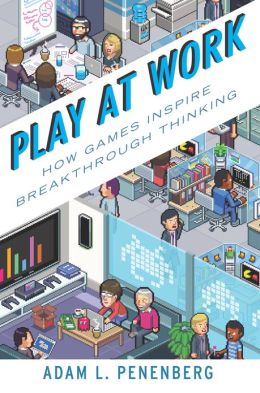4 SIGNS THAT GAMES WILL USHER IN A NEW ERA OF WORK [BOOK REVIEW]
“The last decade witnessed the rise of the social Web, establishing the online framework for how we connect with one another. The next 10 years will usher in the era of game design and carry with it a pervasive net of behavior-altering mechanisms.” ~Adam Penenberg, Play at Work: How Games Inspire Breakthrough Thinking
Play At Work is about harnessing the characteristics that make games so engaging and applying them to other aspects of our lives. Adam discusses the game mechanics that can make employees happier, more productive and motivated, to increase company profits, market new products and to help with customer service.
Overall I give the book a 4 out of 5.
Adam confirms my belief that games (system of principles, mechanisms, and rules that govern a system of rewards that lead to a set of predictable outcomes) will change the way we work tomorrow. Here are the 4 “game” changing signs that became clear to me after reading this book.
4 Signs That Games Will Usher In A New Era Of Work
1) Game play already exists.
Gaining points, achieving new levels and being rewarded is at the core of many of our day to day routines. American Express points, frequent-flyer miles, Weight Wathers, fantasy football, and your LinkedIn status bar are all subtle examples of game play. Pulling more of these game mechanics we already know and secretly love into the forefront of our organizations will enhance employee satisfaction and productivity. Here are a few stats from Play At Work to give you additional context surrounding the pent-up power of game play:
- 97% of 12-17 year olds and 70% of the heads of American households play computer games. (Entertainment Software Association)
- 35% of C-suite executives play video games. (Entertainment Software Association)
- In 2014, 70% of 2,000 global organizations will depend on gamified applications for employee performance, health care, marketing, and training. (Gartner)
- In 2014, 50% of corporate innovation will be gamified, with American corporation spending several billion dollars on it. (Gartner)
2) Humans are wired to game play.
When we achieve new levels in games our brain releases dopamine which prompts excitement, encourages exploration to try new things and helps combat the stagnation caused by failure. Organizations that learn to hack human brains by triggering innate reward systems with game mechanics at work will win tomorrow. The reward-motivated behavior induced by dopamine is the key to increased employee engagement, overcoming challenges, and increased innovation through exploration.
3) Game playing is made easy with technology.
Sensors, technology and hyper-connectivity make today’s culture more ready to embrace gamification than ever before. For example: You wake up and begin brushing your teeth with a smart toothbrush (sensor) that monitors how long you brush and sends your progress to an online leaderborad (hyper-connectivity) and after defeating your opponents you will receive a mobile (technology) toothpaste coupon next time your in the store.
4) Millennials expect to game play.
Before turning 21, the average American has spent 2,000-3,000 hours reading books and more than 3x that playing video games. Does this make them experts? It does according to Malcolm Gladwell’s theory in Outliers that 10,000 hours makes someone an expert. But expert or not, Millennials are natives to game play and will expect to see it in the workplace. Millennials thrive in the collaboration, high failure to learning ratio, and consistent feedback that game play offers so do not be surprised as they demand this type of play from their teams and employers. They will continue to accelerate the acceptance of game playing at work. Be ready.
Favorite Book Quote: "Make work seem less like work, and everyone benefits.”
Adam urges his readers to “Exploit the time that gets wasted with games.” I hope you now agree. Don’t be lame…game.
Question: What other signs do you see that games will play a larger role in tomorrow’s workplace?


